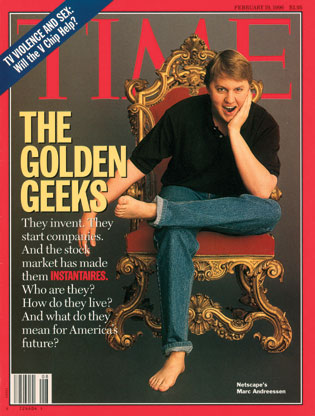Marc Andreessen doesn’t need enemies because he has himself.
The browser billionaire and start-up whisperer often tweets and talks himself into an error message, revealing a stunning lack of insight into how the silicon-less world–and even the silicon one–operates. Like a lot of true believers in meritocracy–David Brooks comes to mind–Andreessen often unwittingly imparts wisdom about the world that’s built almost wholly from bullshit. I think he really means well and has done a lot of good work, but he doesn’t make it easy on himself. Five easy pieces follow from his new Financial Times interview conducted by Caroline Daniel.
____________________
As a child, Andreessen was fascinated by technology. “I have the complete series of Tom Swift from the 1910s to 1950s in my office. That was probably the single most important thing I read,” he says of the science-fiction and adventure books featuring a teenaged inventor hero (Tom Swift and his Photo Telephone was one 1912 title). “I liked all the stuff he’s inventing.”
____________________
He was also fortunate in his decision to study engineering at the University of Illinois: as one of just four sites funded by Congress to host $20m to $40m supercomputers in the mid-1980s, it had funds for “the intercept-net, which became the internet”.
Andreessen sees technology as enabling what he calls the “great awakening”. Waggling his iPhone affectionately, he says: “This little guy right here is the equivalent power capability of the $20m supercomputer I was using. This thing is in two billion people’s hands.”
____________________
He likes television, he says, because it puts the writer in charge, and compares it to the best tech companies which are also built when you put founders in charge for long periods. “By the way, writers are often crazy; they’re unpredictable, they don’t necessarily operate on a budget or timetable you might want. They argue a lot. Which is the same thing we deal with, with founders. But you get the magic.”
____________________
Does he think there is a backlash against powerful tech companies? …
“There is no backlash,” he continues: technology companies remain popular with the public. “There is only the tech backlash of the New Yorker and the New York Times and of the New Republic and of Harvard University.”
I ask why he thinks it is coming from there. “They’re threatened. It’s a power recalibration. There’s a coastal element to it. There’s a liberal arts versus engineering element to it. It’s a two-cultures thing. It’s a CP Snow thing.” Snow, a British chemist and novelist, in the 1950s identified two camps: a liberal arts culture and a science one.
____________________
“Societies are going to get richer; all the birth rates are going to drop. Japan is a harbinger of all of our futures.” In the US, growth would be slowing were it not for “illegal immigration. It’s the best thing that can possibly be happening to us, and I find it ironic; nobody wants to talk about that.”
Tags: Caroline Daniel, Marc Andreessen

